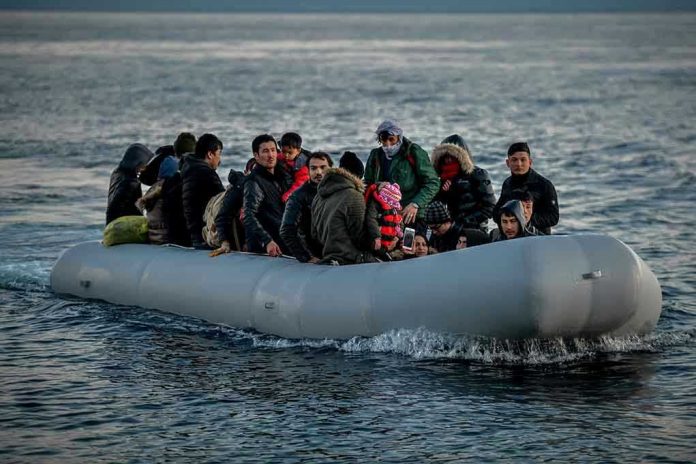
A migrant’s tragic death during a failed Channel crossing exposes once again the madness of policies that incentivize illegal journeys while undermining national sovereignty and common sense.
At a Glance
- A migrant died of cardiac arrest after a boat attempting to reach the UK was forced to turn back to Equihen beach, France.
- Despite enhanced surveillance and rescue operations, nearly 24,000 migrants have crossed the Channel to the UK in small boats in 2025 alone.
- Smuggling networks continue putting lives at risk, exploiting loopholes and soft-border policies that embolden dangerous journeys.
- French and UK authorities have launched yet another investigation, but similar tragedies and political posturing persist.
Channel Crossing Tragedy: The Human Cost of Failed Immigration Policies
On the morning of July 26, 2025, a small boat loaded with migrants turned back to Equihen beach on the northern French coast after a medical emergency erupted onboard. French emergency teams rushed to the scene, performing CPR on a man in cardiac arrest—yet their efforts proved futile. Another life ended in the icy waters of the Channel, a stark reminder of the cost of unchecked illegal immigration and policies that prioritize virtue signaling over real solutions.
Roughly 24,000 migrants have landed in the UK by small boat so far this year, according to the UK Home Office. This number is not just a statistic—it’s a sign of a border in crisis, fueled by policies that encourage illegal crossings and enrich the criminal smuggling networks orchestrating these deadly trips. The English Channel, once a symbol of national security, is now a dangerous highway for those willing to risk their lives, aided by legislative loopholes and political inaction from years of leftist governance.
Smugglers Thrive While Governments Dither
Smuggling syndicates continue to profit as desperate migrants, lured by the promise of easy entry and government handouts, pay thousands for a spot in rickety boats. French authorities patrol the beaches, UK agencies increase surveillance, but the flow goes on. Each fatality triggers another bureaucratic investigation, more statements of concern, and another round of finger-pointing between Paris and London. The so-called “humanitarian” approach fails both the migrants and the citizens footing the bill, leaving local communities to deal with the fallout—strained resources, rising tensions, and a sense that the rule of law is optional.
The death at Equihen is not an isolated incident. Recent years have seen multiple high-profile tragedies in the Channel, yet the same cycle repeats: outrage, promises of reform, and ultimately, more dangerous crossings. This endless loop persists because the incentives remain. As long as illegal entry offers better odds than legal migration, people will keep coming—and smugglers will keep cashing in.
Policy Failure and the Erosion of Sovereignty
The endless stream of crossings and deaths is the legacy of open border fantasies and policies that treat illegal migration as an inevitability rather than a problem to be solved. The Biden era’s soft-touch approach made the UK a magnet for those seeking to bypass the law. Even as President Trump’s administration works to restore order, the damage lingers. Sanctuary policies, endless legal loopholes, and taxpayer-funded benefits have only made the journey more appealing for those willing to flout the system.
Meanwhile, the people who pay the price are not just the migrants—many of whom are exploited and endangered—but also the citizens whose towns, schools, and emergency services are stretched beyond capacity. Local residents in both France and the UK are left to pick up the pieces, wondering why their leaders seem more interested in managing chaos than restoring control. The death toll rises, and so does the frustration among law-abiding citizens who expect government to defend the border, not subsidize its collapse.
Calls for Real Reform Amidst Political Gridlock
French authorities have launched yet another investigation, and the UK Home Office tallies another life lost. But investigations do not fix the problem—they merely document it. Experts and officials cite the need for “coordinated international responses,” yet the core issue remains: as long as policies reward illegal entry and punish enforcement, tragedies like the one at Equihen beach will continue. Calls for safer legal routes and improved rescue operations miss the point by ignoring the root causes: weak enforcement, activist courts, and a political class more interested in virtue signaling than upholding the law.
Until leaders get serious about deterrence, close loopholes, and prioritize citizens over smugglers and opportunists, the Channel will remain a graveyard for the victims of their own failed policies. The time for endless study and empty rhetoric has long passed. Common sense, rule of law, and the interests of the nation must come first—before another preventable tragedy claims another life.



